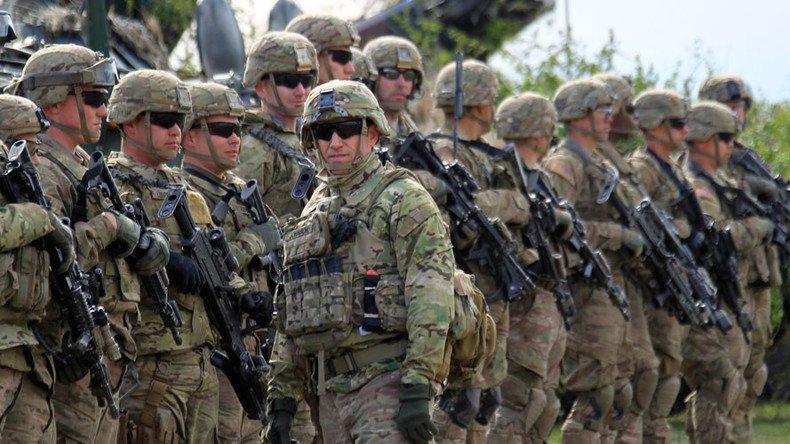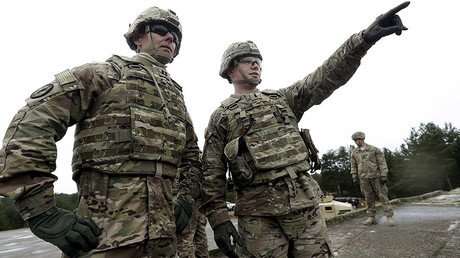'The businessman in Donald Trump may see advantages of NATO membership'

Even though the US President has enormous power on one level, some economic and bureaucratic forces may together have more power, and he could end up with only modest reforms, says Stephen Zunes, Professor of Politics at the University of San Francisco.
During the presidential debates, Donald Trump remarked that NATO is not a gift America can afford to keep giving, and he would expect member states of the military alliance to pay their dues.
RT discussed with experts the future of NATO and the role of the US in the 28-member alliance in light of a Trump presidency, where it will not be business as usual for America's European partners.
RT: As a presidential candidate Donald Trump raised questions about his commitment to automatically defending NATO allies if they are attacked, saying he would first look at their contributions to the alliance. What do you think will change now when he is the US President-elect?
Stephen Zunes: If Trump is serious about following thorough with this, it could be quite significant. The US has paid for a disproportionately large percentage of NATO’s budget, even counting for the size of the US, being the largest member of NATO in terms of population, the US still spends well beyond that percentage in making the alliance viable. And basically, Trump and other people have been saying 'why should the US be paying so much for the defense of wealthy countries, not just those in NATO, but Australia, New Zealand, Japan, South Korea, Saudi Arabia, the Gulf States…’ But the NATO [commitment] has got the most attention given that it is the longest-standing US-led military alliance.
RT: Could we expect the US to leave NATO? What will that mean for the Europe?
SZ: Trump is not necessarily saying, "We should leave NATO," he is just saying that the other parties should pay more of their share. Though he has threatened to not live up to NATO commitments, and even pull off if they refuse to do so. European leaders, most of which support NATO, would realize they might have to come to their own people and say "Hey, folks. The US is not paying as much effort for our military NATO commitment, so we are going to have to spend more money." And that would mean either raising taxes or cutting back on domestic social programs, which most Europeans would rather not see. And so despite the increased tension with Russia in recent years, there are a lot of people who wonder in Europe, in the US and elsewhere, why the NATO alliance even exists. Why should there be so much money for a military alliance, which in many ways is just a relic of the Cold War?
The US government is heavily influenced and controlled by the Pentagon, by the Defense Department and Trump is going to have to follow the lead of the generals and the intelligence services; Trump is not going to be able to radically transform US policy, particularly toward the Russian Federation, China as it relates to the South China Sea and also as it relates to Ukraine. - Abayomi Azikiwe, Editor, Pan-African News Wire
RT: It is a very interesting point. So, what is the viability of NATO existing nowadays?
SZ: That is the big question, actually. Because there are a lot of very powerful interests that are interested in maintaining the status quo. You have, of course, the generals and the career officials at the Department of Defense, you have American arms manufacturers. Indeed, one theory about why NATO was so eager to expand to the East was not that NATO had aggressive designs on Russia, but by converting from the Warsaw Pact - with its dependence on old Soviet weaponry - to NATO, it required these countries to buy billions of dollars of new US weapons, so the systems could be integrated. I think Trump being a businessman might be persuaded that this whole thing about defending Europe is not probably the real reason, it is actually subsidizes powerful American business interests. For a businessman like Trump, maybe he will say that we should keep spending money on NATO after all.
I think also the there is a factor that as President Obama found out. President Obama wanted to cut back military spending, he wanted to get out of Afghanistan, there were a lot of reforms that he wanted to do. There was a lot of push back from very powerful interest like the military corporations, like the Pentagon that he ended up with only very modest reforms and cutbacks. And this is kind of reminder that just because one is the president of the US, even that the president does have enormous amount of power on one level, there are some economic and bureaucratic forces in the US that collectively may actually have more power than the president.
The statements, views and opinions expressed in this column are solely those of the author and do not necessarily represent those of RT.













